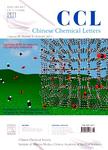Single-molecule FRET studies on interactions between elongation factor 4 (LepA) and ribosomes
Single-molecule FRET studies on interactions between elongation factor 4 (LepA) and ribosomes作者机构:School of Life SciencesTsinghua-Peking Joint Center for Life SciencesBeijing Advanced Innovation Center for Structural BiologyTsinghua University School of Life Sciences and Technology Center for Protein SciencesTsinghua University
出 版 物:《Chinese Chemical Letters》 (中国化学快报(英文版))
年 卷 期:2018年第29卷第10期
页 面:1503-1508页
核心收录:
学科分类:0710[理学-生物学] 07[理学] 071007[理学-遗传学]
基 金:supported by funds from the National Natural Science Foundation of China (No. 31570754) Tsinghua-Peking Joint Center for Life Sciences and Beijing Advanced Innovation Center for Structural Biology to C. Chen Lab Innovation Funding from Lab and Instrument Department, Tsinghua University to W. Wang
主 题:Ribosome Single-molecule biophysics Translation Fluorescence resonance energy transfer GTPase
摘 要:Elongation factor 4(EF4) is one of the highly conserved translational GTPases, whose functions are largely unknown. Structures of EF4 bound ribosomal PRE-translocation and POST-translocation complexes have both been visualized. On top of cellular, structural, and biochemical studies, several controversial models have been raised to rationalize functions of EF4. However, how EF4 modulates elongation through its interactions with ribosomes has not been revealed. Here, using single-molecule fluorescence resonance energy transfer assays, we directly captured short-lived EF4·GTP bound ribosomal PRE and POST translocation complexes, which may adopt slightly different conformations from structures prepared using GDP, GDPNP, or GDPCP. Furthermore, we revealed that EF4·GTP severely impairs delivery of aminoacyl-tRNA into the A-site of the ribosome and moderately accelerates translocation. We proposed that functions of EF4 are to slow overall elongation and to stall majority of ribosomes in POST states under stress conditions.



